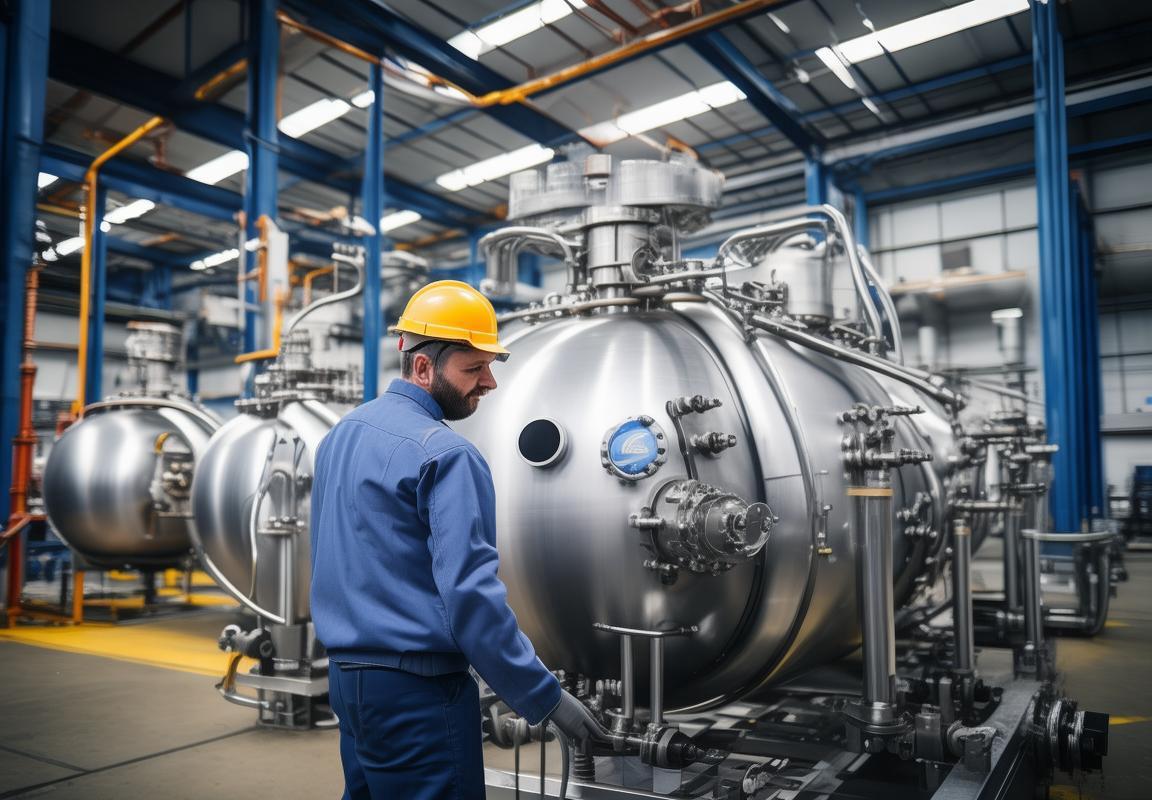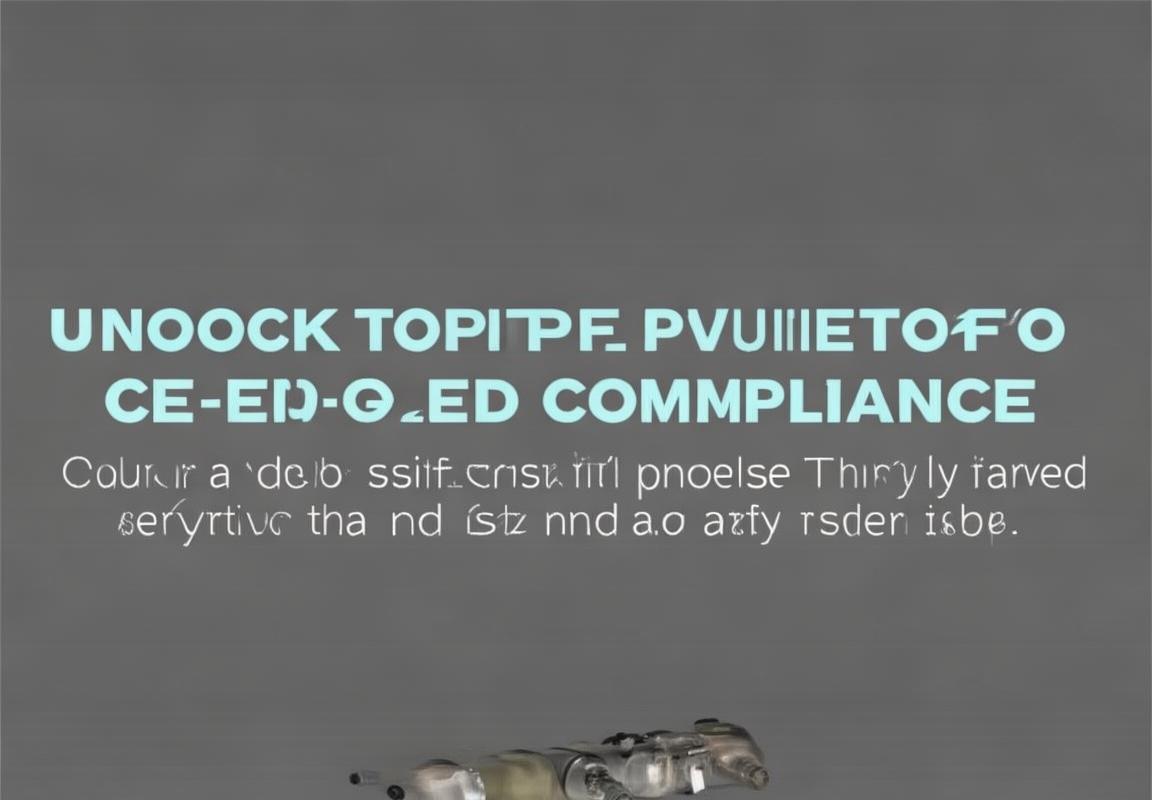Exploring the seamless world of turnkey CE-PED certification for pressure models, we delve into the intricacies of this essential process and the transformative impact it has on industries reliant on precise pressure measurements. From understanding the certification’s significance to navigating the complexities of the process, we uncover the why, how, and what’s next for this vital service.
Understanding Turnkey CE-PED Certification for Pressure Models
Turnkey CE-PED certification for pressure models is a comprehensive process designed to ensure that these models meet stringent European standards for pressure equipment. It’s a bit like getting a stamp of approval that says, “This model is up to snuff and ready for the European market.” But what exactly does this certification entail, and why is it so crucial for companies dealing with pressure equipment? Let’s dive into the details.
First off, let’s tackle the term “CE-PED.” CE stands for Conformité Européenne, which translates to European Conformity. It’s a mark that signifies a product meets all the necessary health, safety, and environmental protection requirements set by the European Union. PED, or Pressure Equipment Directive, is a specific directive within the EU that governs the design, manufacture, and conformity assessment of pressure equipment.
When we talk about pressure models, we’re referring to devices or systems that are designed to contain, transport, or produce pressure. This could include everything from boilers and pressure vessels to pipelines and heat exchangers. These models are critical in various industries, from energy and manufacturing to pharmaceuticals and food processing.
Now, the “turnkey” aspect of this certification is where it gets interesting. Turnkey certification means that a company can handle the entire process for you, from start to finish. This includes everything from understanding the regulations to conducting the necessary tests and assessments, and finally, obtaining the CE-PED mark.
Understanding the regulations is the first step. The PED directive is quite extensive, covering a wide range of pressure equipment. It outlines the essential safety requirements that must be met, including design, manufacture, and conformity assessment procedures. Navigating these regulations can be complex, especially for companies that are not well-versed in European law.
The next step is the design and manufacture of the pressure model. This is where the technical expertise comes into play. The design must be robust and meet the safety standards set out in the PED directive. It’s not just about creating a pressure model that works; it’s about ensuring that it’s safe and reliable, even under the most demanding conditions.
Once the design is complete, the pressure model must undergo a series of tests and assessments. These are designed to verify that the model meets the required safety standards. This can include pressure tests, leak tests, and material analysis, among others. The turnkey certification provider will manage this process, ensuring that all tests are conducted according to the latest standards and regulations.
Conformity assessment is another critical component of the CE-PED certification process. This involves reviewing the design, manufacturing process, and test results to ensure compliance with the PED directive. The turnkey provider will coordinate with the relevant authorities to facilitate this assessment.
Obtaining the CE-PED mark is the culmination of the process. Once the model has passed all the tests and assessments, the CE mark can be affixed to the product. This mark is a powerful symbol of quality and safety, and it opens up the door to the European market.
But what are the benefits of choosing a turnkey solution for CE-PED certification? For one, it saves time and resources. Instead of trying to navigate the complex process alone, companies can rely on the expertise of a turnkey provider. This means that they can focus on their core business activities, confident that the certification process is being handled by professionals.
Another benefit is the peace of mind that comes with knowing that the pressure model has been thoroughly tested and assessed. Compliance with the PED directive is not just about meeting regulations; it’s about ensuring the safety of the end-users. A turnkey certification provider will have the knowledge and experience to ensure that all safety aspects are covered.
There are also cost considerations. While it may seem like hiring a turnkey provider adds an extra expense, it can actually be more cost-effective in the long run. By avoiding potential pitfalls and delays, companies can save money on legal fees, fines, and the cost of redoing work that doesn’t meet the necessary standards.
In conclusion, turnkey CE-PED certification for pressure models is a vital process for companies looking to enter the European market. It ensures that their products meet the highest safety standards and gain access to a vast consumer base. By choosing a turnkey solution, companies can streamline the process, save time and money, and rest assured that their products are ready for the European stage.

What is CE-PED Certification?
CE-PED certification, or Conformité Européenne-Pédagogique (European Conformity-Pedagogical) certification, is a crucial process for ensuring that pressure models meet stringent European standards for safety, performance, and educational use. This certification is not just a regulatory requirement; it’s a guarantee that the products are designed with the end-user’s needs in mind, particularly within the educational sector.
The CE marking is widely recognized across the European Union and signifies that a product has met all the necessary health, safety, and environmental protection requirements. When it comes to pressure models, the addition of the “PED” prefix indicates that the product falls under the Pressure Equipment Directive (PED), which is a legal framework that sets out the essential safety requirements for the design, manufacture, and conformity assessment of pressure equipment.
The PED directive is specifically tailored to address the risks associated with pressure equipment, which can range from simple domestic appliances to complex industrial systems. For pressure models used in educational settings, this means that the products must be designed to withstand pressure without posing a risk to students or educators.
At the heart of CE-PED certification is the concept of risk assessment. Manufacturers must evaluate the potential risks associated with their pressure models and ensure that the design, materials, and manufacturing processes mitigate these risks effectively. This involves considering factors such as the maximum allowable pressure, the temperature at which the model will operate, and the intended use of the model.
One of the key aspects of CE-PED certification is compliance with harmonized European standards. These standards provide specific technical requirements that must be met, ensuring consistency across different products and manufacturers. For pressure models, this could include standards related to material specifications, design criteria, testing procedures, and user instructions.
The certification process for CE-PED is thorough and involves several stages. Firstly, the manufacturer must conduct a thorough risk assessment of the pressure model. This includes identifying potential hazards, such as the risk of explosion, and determining how the model can be designed to minimize these risks.
Following the risk assessment, the manufacturer must ensure that the pressure model complies with the relevant European standards. This may involve conducting tests to verify the model’s performance, such as pressure tests, leak tests, and material strength tests. The results of these tests must meet the specified requirements outlined in the harmonized standards.
Once the product has been deemed compliant with the technical standards, the manufacturer must then undergo a conformity assessment procedure. This is typically carried out by a notified body, which is an organization recognized by the European Union to carry out certain types of conformity assessment. The notified body will inspect the manufacturing process, review the documentation, and conduct audits to ensure that the manufacturer is adhering to the PED directive.
Another important aspect of CE-PED certification is the provision of technical documentation. This includes design calculations, manufacturing drawings, test reports, and instructions for use. These documents must be clear, accurate, and readily available to demonstrate compliance with the PED directive.
Once all the requirements are met, the manufacturer can affix the CE marking to the pressure model. This marking is a declaration of conformity, indicating that the product meets all the necessary European regulations. It also allows the product to be freely sold within the European Union, as it demonstrates compliance with the internal market rules.
For educational institutions, the CE-PED certification of pressure models is particularly significant. It ensures that the equipment is safe for use in a learning environment, which is critical for the well-being of students and the effectiveness of educational activities. It also means that educators can trust the reliability and accuracy of the models they use to teach complex concepts related to pressure and fluid dynamics.
In summary, CE-PED certification for pressure models is a comprehensive process that involves risk assessment, compliance with European standards, conformity assessment, and the provision of technical documentation. It is a testament to the manufacturer’s commitment to safety and quality, and it provides peace of mind to users that the pressure models they rely on are fit for purpose and meet the highest standards of European legislation.

Why is CE-PED Certification Important for Pressure Models?
CE-PED certification, which stands for Conformité Européenne – Pressure Equipment Directive, is a crucial process for pressure models for several compelling reasons. This certification ensures that these models meet stringent European safety and quality standards, which in turn has a profound impact on their marketability, safety, and regulatory compliance. Here’s a deeper look into why this certification is so important:
-
Ensuring Compliance with European RegulationsPressure models that operate within the European Union must adhere to the Pressure Equipment Directive (PED). This directive covers the design, manufacture, and conformity assessment of pressure equipment and assemblies, ensuring they are safe to use. CE-PED certification is the proof of compliance, allowing manufacturers to legally sell their products across EU borders.
-
Enhancing Product SafetySafety is paramount in the world of pressure equipment, especially when it comes to models that are designed to handle high-pressure applications. CE-PED certification requires rigorous testing and evaluation to confirm that these models are designed and constructed with safety as a top priority. This not only protects users but also reduces the risk of accidents and damage to property.
-
Gaining Consumer TrustIn a market where consumers are increasingly aware of product safety and quality, having CE-PED certification can be a significant differentiator. It serves as an assurance that the pressure model has been scrutinized by a certified body, instilling confidence in potential buyers. This trust can be a deciding factor when customers are comparing products from different manufacturers.
-
Facilitating Market AccessThe CE marking is a symbol of conformity that allows manufacturers to access the single market of the European Union. Without CE-PED certification, a pressure model may not be allowed to circulate within the EU, which can severely limit a company’s business opportunities and growth potential.
-
Reducing Liability RisksBy obtaining CE-PED certification, manufacturers can significantly reduce their legal liability risks. In the event of a product failure or accident, certification can provide a defense in court, demonstrating that the equipment was designed and manufactured in accordance with the highest safety standards.
-
Encouraging Innovation and Quality ImprovementThe CE-PED certification process encourages manufacturers to innovate and improve the quality of their pressure models. The need to meet strict criteria and undergo comprehensive assessments pushes companies to invest in research and development, leading to more reliable and efficient products.
-
International RecognitionBeyond the EU, CE-PED certification is recognized in many other countries, including non-EU member states. This means that obtaining certification can open doors to international markets, making it a valuable asset for global business expansion.
-
Regular Updates and Continuous ImprovementCE-PED certification is not a one-time process; it requires regular updates and maintenance to ensure that the pressure model continues to meet the latest standards. This ensures that the product remains at the forefront of technology and safety, offering a level of assurance that can only be provided by an ongoing commitment to quality.
-
Facilitating Technical DocumentationThe certification process involves the preparation of detailed technical documentation, which is essential for the safe operation of pressure models. This documentation not only supports compliance but also serves as a reference for users, engineers, and inspectors, providing a clear understanding of the equipment’s design and operation.
-
Promoting Fair CompetitionCE-PED certification promotes fair competition in the market by ensuring that all manufacturers operate under the same set of rules and regulations. This level playing field helps prevent unfair advantages that might arise from manufacturers not adhering to the same safety and quality standards.
In conclusion, CE-PED certification is vital for pressure models due to its role in ensuring compliance, enhancing safety, building consumer trust, facilitating market access, reducing liability risks, encouraging innovation, gaining international recognition, ensuring continuous improvement, facilitating technical documentation, and promoting fair competition. This certification is not just a legal requirement; it is a testament to the commitment to excellence in the design and manufacturing of pressure equipment.

The Benefits of Turnkey Certification
Navigating the complex world of product certification can be daunting, but when it comes to pressure models, the turnkey certification process offers a streamlined and efficient solution. Here are the numerous benefits that come with opting for a turnkey certification service:
Efficiency in Time and ResourcesA turnkey certification service provides a complete package, which means all aspects of the certification process are handled under one roof. This consolidation of resources and efforts can significantly reduce the time it takes to get your pressure model certified. By eliminating the need to coordinate with multiple parties, you can expect a more rapid turnaround.
Reduced CostsWhen you go through a turnkey certification service, you’re essentially paying for a comprehensive solution that covers all the necessary steps. This can often lead to cost savings, as you avoid the expenses associated with hiring separate consultants, engineers, or compliance experts. The all-inclusive approach ensures that you’re not overspending on individual components of the certification process.
Expertise and ExperienceTurnkey certification services are typically provided by companies with extensive experience in the field. This means that the team handling your certification is well-versed in the latest industry standards, regulations, and best practices. Their expertise can be invaluable in navigating the intricacies of certification, ensuring that your pressure model meets all necessary criteria without unnecessary delays.
Simplified Compliance ProcessThe CE-PED (Conformité Européenne – Pressure Equipment Directive) certification is a stringent process that requires adherence to European Union regulations. A turnkey service simplifies this process by managing all compliance requirements. This includes the preparation of technical documentation, ensuring that your product meets the necessary safety standards, and facilitating the necessary inspections and tests.
Reduced Risk of Non-ComplianceNon-compliance with CE-PED regulations can lead to costly penalties, product recalls, and damage to your company’s reputation. A turnkey certification service minimizes this risk by ensuring that every aspect of your pressure model is in full compliance with the directive. This peace of mind is a significant benefit, especially for companies that are new to the certification process.
Enhanced Market AccessCE-PED certification is not just about compliance; it’s also a gateway to the European market. By obtaining this certification, you open the door to selling your pressure models in the EU, which represents a significant opportunity for growth. A turnkey certification service can help you capitalize on this market by ensuring your product meets all the necessary standards from the outset.
Customized SolutionsTurnkey certification services often offer customized solutions that cater to the specific needs of your pressure model. Whether you’re dealing with a standard design or a specialized product, the service can tailor the certification process to fit your unique requirements. This flexibility ensures that you receive a certification that is as unique as your product.
Continuous SupportOnce your pressure model is certified, the turnkey service may offer ongoing support. This could include assistance with any updates or modifications to your product that may be required to maintain compliance with CE-PED regulations. The continuous support can be a crucial asset, especially as regulations and standards evolve over time.
Peace of MindFinally, the most significant benefit of turnkey certification is the peace of mind it brings. Knowing that your product has been thoroughly evaluated and certified to meet the highest safety standards can be incredibly reassuring. This confidence allows you to focus on other aspects of your business, such as product development and marketing, without the added stress of certification hanging over your head.
In summary, turnkey certification offers a multitude of benefits that go beyond the mere act of obtaining a CE-PED certification for pressure models. From efficiency and cost savings to expertise and market access, the turnkey approach provides a comprehensive solution that can streamline the certification process and set your product up for success in the European market.

How Turnkey CE-PED Certification Works
Navigating the complexities of certification can be daunting, especially for pressure models that require CE-PED certification. The turnkey process simplifies this journey, ensuring that every step is streamlined and efficient. Here’s how turnkey CE-PED certification for pressure models typically works:
The turnkey process begins with a thorough assessment of the pressure model in question. This involves a detailed review of the design, materials, and manufacturing processes to ensure compliance with the stringent requirements of the CE-PED directive. Engineers and quality assurance experts meticulously examine every aspect to identify any potential issues or areas that may require adjustment.
Once the assessment is complete, the turnkey provider takes over the task of addressing any non-compliance issues. This could mean modifying the design, sourcing compliant materials, or adjusting manufacturing techniques. The goal is to bring the pressure model into full compliance with the CE-PED directive without requiring the original manufacturer to navigate these changes alone.
With the model now in compliance, the turnkey provider moves on to the documentation phase. This is a critical step, as it involves compiling all the necessary technical files, test reports, and safety assessments. These documents are essential for demonstrating that the pressure model meets the required safety standards and performance criteria. The turnkey provider ensures that every piece of documentation is accurate, up-to-date, and meets the regulatory requirements.
Next comes the testing phase. Turnkey certification often includes the execution of a series of tests to validate the performance and safety of the pressure model. These tests can range from burst pressure tests to leak tests, and they are conducted in accordance with the CE-PED directive. The turnkey provider coordinates these tests, ensuring that all results are recorded and analyzed to confirm compliance.
Once the testing is successfully completed, the turnkey provider prepares the application for the CE marking. This involves submitting all the required documentation and test results to the relevant certification authority. The turnkey provider acts as the liaison between the manufacturer and the certification body, ensuring that the application is processed smoothly and efficiently.
The certification authority then reviews the application and conducts its own assessment if necessary. This can include on-site audits or additional testing. The turnkey provider is responsible for facilitating these assessments and providing any additional information or support required by the certification authority.
Upon successful completion of the assessment, the certification authority issues the CE marking. This is a significant milestone, as it signifies that the pressure model has been officially certified as compliant with the CE-PED directive. The turnkey provider ensures that the manufacturer receives this certification promptly and that all necessary documentation is provided for future reference.
The final step in the turnkey process is the ongoing compliance and maintenance. This includes regular reviews of the pressure model to ensure continued compliance with the CE-PED directive. The turnkey provider may also offer support in the event of any changes to the product or updates to the directive, ensuring that the manufacturer remains in full compliance at all times.
Throughout the entire process, the turnkey provider acts as a single point of contact for the manufacturer. This means that the manufacturer does not have to deal with multiple consultants or agencies, simplifying the process and reducing the risk of errors or delays. The turnkey provider’s expertise in CE-PED certification ensures that the manufacturer can focus on its core business activities, confident that the certification process is being handled by professionals.
In summary, the turnkey CE-PED certification process for pressure models is a comprehensive, end-to-end service that simplifies compliance with the CE-PED directive. From initial assessment and design adjustments to documentation, testing, and certification, the turnkey provider ensures that every step is taken care of, allowing the manufacturer to benefit from a streamlined and efficient certification process that meets all regulatory requirements.

Key Components of the Certification Process
The certification process for CE-PED (Pressure Equipment Directive) compliance is a multifaceted endeavor that involves several key components to ensure safety, quality, and adherence to European Union standards. Here’s a breakdown of these critical elements:
Involvement of Technical ExpertsTechnical experts play a pivotal role in the certification process. They possess the knowledge and experience necessary to evaluate the design, manufacturing, and testing of pressure equipment to ensure they meet CE-PED requirements.
Compliance with Design and Construction StandardsThe process begins with the assessment of the pressure equipment’s design and construction to ensure they align with the CE-PED directives. This includes verifying that materials, dimensions, and manufacturing processes are up to standard.
Testing and InspectionBefore certification, pressure equipment must undergo rigorous testing to confirm its safety and reliability. This can include pressure tests, leak tests, and other mechanical and safety assessments. Inspections are also conducted during manufacturing to catch any potential issues early.
Documentation and ReportingDocumentation is king in the certification process. Manufacturers must provide comprehensive technical files that detail the design, manufacturing process, and results of all tests and inspections. These documents serve as evidence of compliance and are crucial for the certification authority.
Conformity AssessmentConformity assessment is a critical step in the certification process. It involves a thorough review of the technical files and, in some cases, on-site audits. The certification authority evaluates whether the pressure equipment meets the necessary standards and criteria.
CE MarkingOnce the equipment has passed all the required assessments, it can be CE marked. The CE mark signifies that the product complies with all applicable EU directives, including the CE-PED. This marking is essential for placing the product on the EU market.
Continuous Monitoring and Post-Marketing SurveillanceEven after certification, the process doesn’t end. Continuous monitoring is crucial to ensure that the pressure equipment remains compliant with CE-PED regulations. Post-marketing surveillance may include periodic checks, maintenance, and recalls if necessary.
Accreditation of Certification BodiesCertification bodies must be accredited by a recognized authority to conduct CE-PED certification. This accreditation ensures that the certification process is credible and that the certification body adheres to the highest standards of quality and professionalism.
Training and AwarenessEmployees involved in the design, manufacturing, and certification process must be adequately trained and aware of the CE-PED requirements. This includes understanding the technical specifications, safety regulations, and the importance of compliance.
Legal and Administrative RequirementsThe certification process also involves understanding and adhering to legal and administrative requirements. This includes understanding the obligations of manufacturers, importers, and distributors under the CE-PED and other related legislation.
Technical Assistance and SupportManufacturers often seek technical assistance and support throughout the certification process. This can come from consultants, engineers, or certification bodies themselves, providing guidance on how to meet the necessary standards.
International HarmonizationCE-PED certification is part of an international harmonization effort to ensure that pressure equipment safety standards are consistent across different countries. This harmonization helps facilitate trade and ensures a high level of safety for end-users.
Feedback and ImprovementThe certification process includes mechanisms for feedback and improvement. Manufacturers and certification bodies must be open to suggestions and improvements in the certification process, ensuring that it evolves with technological advancements and regulatory changes.
Collaboration with Regulatory BodiesLastly, collaboration with regulatory bodies is essential. Certification bodies must work closely with these agencies to ensure that the certification process aligns with the latest regulations and that any changes are communicated effectively to all stakeholders.
These key components collectively ensure that pressure models and other equipment are safe, reliable, and compliant with the CE-PED standards, providing peace of mind to manufacturers and consumers alike.

Navigating the Turnkey CE-PED Certification Process
Understanding the ins and outs of the CE-PED certification process for pressure models can be daunting, but with a turnkey solution, it becomes a smoother journey. Here’s how you can navigate this process effectively:
Detailed Technical AnalysisThe turnkey certification process for pressure models involves a comprehensive technical analysis. This step is crucial as it ensures that the models meet the stringent European Directives and regulations. Engineers and technicians meticulously examine the design, materials, and manufacturing processes to guarantee compliance with CE-PED (Conformité Européenne – Pressure Equipment Directive).
Documentation and Compliance VerificationA significant aspect of the process is the thorough documentation and compliance verification. Turnkey providers typically handle the gathering of all necessary technical files, including design drawings, material certifications, manufacturing records, and test results. They verify that these documents align with the CE-PED requirements, which are comprehensive and detailed.
Risk Assessment and Safety EvaluationThe risk assessment and safety evaluation are pivotal in the certification process. Turnkey providers conduct in-depth analyses to identify potential hazards associated with the pressure models. This involves not only evaluating the design for safety but also considering the operational conditions under which the equipment will be used. The goal is to ensure that the models are safe for both users and the environment.
Testing and ValidationTesting is a critical component of the CE-PED certification process. Turnkey solutions often include a range of tests designed to validate the pressure models’ performance, durability, and safety. These tests might include pressure testing, leak testing, material testing, and functional testing. The turnkey provider coordinates these tests and ensures they are conducted by certified laboratories.
CE Marking and LabelingOnce the pressure models pass all the necessary tests and evaluations, the CE marking is applied. This mark is a declaration of conformity with the essential health and safety requirements of the European Union. The turnkey provider assists in the proper labeling of the products, ensuring that all required information, such as the manufacturer’s name, model number, and pressure limits, is clearly displayed.
Technical File CompilationA detailed technical file is compiled as part of the certification process. This file contains all the necessary documentation to demonstrate compliance with CE-PED. It is essential for regulatory authorities and end-users to have access to this information. Turnkey providers are adept at organizing and compiling these files, making them easily accessible and understandable.
Post-Certification SupportThe certification process doesn’t end with the application of the CE mark. Turnkey providers often offer post-certification support to ensure that the pressure models continue to meet CE-PED standards. This may include regular maintenance checks, updates to technical files, and advice on how to address any changes in the market or regulations.
Training and EducationFor those involved in the certification process, whether they are engineers, technicians, or administrative staff, training and education are key. Turnkey providers may offer workshops or training sessions to ensure that all personnel are well-versed in the requirements and procedures of CE-PED certification. This is especially important as regulations and standards can evolve over time.
Regulatory Compliance MonitoringStaying compliant with CE-PED is an ongoing process. Turnkey providers often include regulatory compliance monitoring as part of their service. They keep abreast of any changes in regulations and ensure that the pressure models remain in compliance throughout their lifecycle.
International Market AccessOne of the significant benefits of CE-PED certification is the ability to access the European market. Turnkey solutions facilitate this by ensuring that all the necessary steps are taken to meet the requirements not only for the EU but also for other markets that recognize the CE mark. This can open up new business opportunities and expand the market reach for manufacturers.
Customer Support and After-Sales ServiceThroughout the certification process, turnkey providers offer customer support and after-sales service. They are there to answer questions, provide guidance, and assist with any issues that may arise. This level of support is crucial for a seamless and successful certification journey.
Navigating the turnkey CE-PED certification process for pressure models requires a careful and detailed approach. By partnering with a turnkey provider, manufacturers can ensure that every step is taken to meet the necessary standards and regulations, ultimately leading to a successful certification and the ability to market their products across the European Union and beyond.

Why Choose Turnkey Solutions for CE-PED Certification?
Navigating the complexities of certification can be daunting, especially when it comes to CE-PED (Conformité Européenne – Performance of Equipment Directive) certification for pressure models. This comprehensive process ensures that products meet stringent European safety standards. Opting for turnkey solutions can streamline this journey significantly. Here’s a look at why choosing turnkey solutions for CE-PED certification is a wise decision:
The turnkey approach to certification involves a single point of contact, which simplifies the process immensely. Instead of dealing with multiple agencies or consultants, you have a dedicated team handling every aspect of your certification. This centralized management means you get clear communication, reducing the risk of misunderstandings or delays.
Turnkey solutions typically include a thorough understanding of the CE-PED directive. This expertise ensures that your pressure model is assessed against all relevant standards, from design and manufacturing to compliance with European regulations. Such knowledge can be invaluable, especially for companies unfamiliar with the intricacies of European certification.
One of the primary benefits of turnkey solutions is the efficiency they bring to the process. By having a team that specializes in CE-PED certification, you can expect a more streamlined process, with each step carefully managed to ensure compliance. This efficiency not only saves time but also reduces costs associated with certification.
Turnkey solutions often come with a wealth of resources at your disposal. This might include access to testing facilities, regulatory updates, and compliance documents. Such resources are essential for maintaining up-to-date knowledge and ensuring that your pressure model remains compliant with the latest standards.
Another advantage of turnkey solutions is the support provided throughout the certification process. From initial guidance on how to meet the requirements to ongoing assistance with any regulatory changes, having a knowledgeable team by your side can be a lifesaver. This support is particularly important for companies that may not have the in-house expertise to navigate the CE-PED process alone.
Turnkey solutions also offer flexibility. They can tailor their services to meet the specific needs of your company and your product. Whether you require assistance with documentation, technical testing, or marketing compliance, a turnkey provider can offer a customized approach that fits your unique situation.
Choosing a turnkey solution for CE-PED certification can also help mitigate the risks associated with non-compliance. The CE mark is a symbol of quality and safety that European consumers and businesses look for. By ensuring your pressure model meets these standards, you can avoid potential fines, recalls, or damage to your brand reputation.
Moreover, turnkey solutions can provide valuable insights into the European market. They understand the local preferences, regulations, and consumer expectations. This knowledge can be a significant asset when expanding into new markets or seeking to improve your product’s appeal to European customers.
The peace of mind that comes with turnkey solutions is hard to overstate. When you’re dealing with the certification of a pressure model, the last thing you want is uncertainty or stress. Turnkey providers take care of the heavy lifting, allowing you to focus on what you do best—running your business.
In conclusion, the decision to go with a turnkey solution for CE-PED certification is a strategic one. It simplifies the process, leverages expertise, saves time and money, provides comprehensive support, offers flexibility, mitigates risks, and gives you insights into the European market. When it comes to ensuring your pressure model meets the highest safety and quality standards, choosing a turnkey provider can make all the difference.

Case Studies: Success Stories with Turnkey CE-PED Certification
In the world of pressure models, achieving CE-PED certification is a significant milestone. Let’s delve into some success stories that showcase the effectiveness of turnkey certification solutions.
One such story is that of a small engineering firm specializing in the design and testing of pressure vessels. They had been struggling to navigate the complex process of CE-PED certification, with limited resources and expertise. However, with the help of a turnkey certification provider, they were able to streamline the process and successfully obtain the certification.
The turnkey solution included comprehensive guidance on the necessary documentation, ensuring that all technical specifications and safety requirements were met. The provider also assisted with the preparation of the technical file, which is a crucial component of the certification process. This file includes detailed information about the pressure model, its design, materials, manufacturing processes, and testing results.
The firm’s engineers were initially apprehensive about the certification process, as they were not well-versed in the intricacies of CE-PED regulations. However, the turnkey provider offered them personalized training sessions, which helped demystify the regulations and gave them the confidence to proceed.
As the certification process unfolded, the engineers encountered several challenges. The turnkey provider was there to address these issues promptly, whether it was providing clarification on specific regulations or offering solutions to technical problems. This level of support was invaluable, as it minimized the time and effort required for the firm to meet the certification requirements.
Once the certification was awarded, the firm experienced a surge in business opportunities. Their CE-PED-certified pressure models were now eligible for export to the European Union, opening up new markets and potential collaborations. The firm’s reputation also improved, as they could now confidently market their products as compliant with the highest safety standards.
Another success story comes from a large manufacturing company that produces a variety of pressure models for industrial applications. The company had previously attempted to obtain CE-PED certification in-house but faced numerous setbacks. They were on the brink of when they discovered a turnkey certification solution that offered a more efficient and reliable path to compliance.
The turnkey provider took a holistic approach to the certification process, starting with a thorough assessment of the company’s current practices and systems. They identified areas that needed improvement and developed a tailored plan to address these gaps. This included revising quality management procedures, updating technical documentation, and ensuring that all products met the necessary safety standards.
Throughout the process, the turnkey provider maintained open lines of communication with the company’s management and staff. They provided regular updates on the progress and were always available to answer questions or provide additional support. This helped to keep everyone informed and engaged, ensuring a smooth and collaborative certification journey.
The result was a CE-PED certification that not only met the requirements of the European Union but also exceeded the company’s expectations. The certification process was completed in a fraction of the time it would have taken if the company had attempted it alone. Moreover, the company’s products gained a competitive edge in the European market, leading to increased sales and a strengthened position within the industry.
These success stories illustrate the value of turnkey certification solutions for pressure models. By partnering with a reputable provider, companies can overcome the complexities of the certification process, save time and resources, and ultimately achieve compliance with international safety standards. The turnkey approach ensures that every step is carefully managed, from initial assessment to final certification, leading to successful outcomes for businesses of all sizes.

The Future of Turnkey CE-PED Certification for Pressure Models
Navigating the complexities of certification can be daunting, especially for pressure models that require CE-PED (Conformité Européenne – Pressure Equipment Directive) certification. The future of turnkey CE-PED certification for pressure models hinges on several factors that are shaping the industry and the way certifications are obtained. As we look ahead, it’s clear that innovation, regulatory compliance, and customer satisfaction will be at the forefront.
The integration of advanced technology into the certification process is expected to streamline operations and enhance accuracy. With the rise of Industry 4.0, we’re seeing a surge in smart sensors and automated testing equipment that can provide real-time data and insights. This not only speeds up the certification process but also reduces the margin for human error. As these technologies become more prevalent, the future of turnkey CE-PED certification for pressure models will be marked by a higher standard of quality and efficiency.
Regulatory bodies are continuously updating their guidelines to ensure that pressure equipment meets the latest safety standards. Compliance with these evolving regulations is crucial for manufacturers and users alike. Turnkey certification providers are adapting to these changes by staying abreast of new requirements and incorporating them into their services. This proactive approach ensures that pressure models remain certified throughout their lifecycle, minimizing the risk of non-compliance and associated penalties.
Customer expectations are also shifting, with a growing emphasis on sustainability and environmental responsibility. Pressure models that are certified under the CE-PED directive are already subject to stringent environmental standards. However, the future will likely see even more pressure on manufacturers to incorporate eco-friendly practices into their production processes. Turnkey certification solutions that offer sustainability assessments and guidance will become increasingly valuable.
Another key factor in the future of turnkey CE-PED certification for pressure models is the global market. As trade barriers continue to fall and international trade becomes more accessible, the demand for standardized certifications like CE-PED is likely to increase. Turnkey providers that can offer a seamless certification process across multiple jurisdictions will have a competitive edge. This means that the future will see a greater emphasis on global expertise and the ability to navigate diverse regulatory landscapes.
The role of certification bodies will also evolve. They will not only be responsible for verifying compliance but may also play a more active role in the design and development phases of pressure models. This could involve providing technical advice, ensuring that the models are designed with future-proofing in mind, and helping manufacturers anticipate future regulatory changes. The future of turnkey CE-PED certification will thus involve a more collaborative approach between manufacturers, certification bodies, and regulatory authorities.
The rise of digital certificates and blockchain technology is another trend that could reshape the certification landscape. Digital certificates offer a secure, tamper-proof way to verify the authenticity of a CE-PED certification. Blockchain technology can further enhance this by creating an immutable record of all transactions and certifications. This not only simplifies the process of verifying certifications but also reduces the risk of fraud, which is a significant concern in the certification industry.
In the realm of customer service, the future will likely see a shift towards personalized support. Turnkey certification providers will need to offer tailored solutions that address the specific needs of each client. This could involve customized compliance strategies, ongoing technical support, and training programs to ensure that clients maintain their certifications over time.
Lastly, the future of turnkey CE-PED certification for pressure models will be characterized by a strong focus on continuous improvement. Manufacturers and certification providers will be encouraged to innovate and find new ways to enhance the safety, reliability, and sustainability of pressure models. This could involve investing in research and development, adopting new materials, and exploring alternative manufacturing processes.
As the industry continues to evolve, the future of turnkey CE-PED certification for pressure models will be shaped by a combination of technological advancements, regulatory changes, customer demands, and global market trends. By staying adaptable and forward-thinking, turnkey certification providers can ensure that they remain at the forefront of this dynamic field.